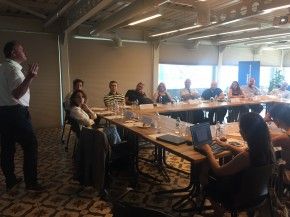FICPI-Turkey arranged the seventh of its traditional roundtable meetings in September, this time focusing on the trade mark similarity concept for the assessment of likelihood of confusion and the approach of the Turkish Patent and Trademark Office, Türk Patent, and the Courts.

Ms. Gökçe İzgi, a member of the Board of Directors of FICPI-Turkey, moderated the meeting accompanied by Mr. Türkay Alıca, who is a Retired Judge of Civil Courts for Intellectual and Industrial Property Rights. 22 participants were present at the meeting including some FICPI-Turkey members.
Mr. Uğur Aktekin, President of FICPI-Turkey, opened the meeting, informing attendees that the National Section's aim is to organise roundtable meetings and that the present meeting was a continuation of a previous meeting dealing with the similarity of goods and services.
Moderator Gökçe İzgi started the discussions, mentioning that similarity between trade marks is a basic criterion of trade mark law and this issue includes different and special criteria and evaluations in itself which they would try to address during the meeting.
Technical or legal confusion
At this point, Judge Alıca said that while he considered the possibility of confusion to be a legal issue, the Supreme Court considered it to be a technical issue in some decisions, particularly in terms of the similarity of goods/services.
Later, Judge Alıca added that the assessment of likelihood of confusion requires a thorough examination, and if there is indeed potential for confusion, then the similarity of goods and services should be looked at first with the relevant consumer profile being determined. Afterwards, the level of attention of the relevant consumer in receiving the goods or services concerned should be taken into account.
Quality of the trade mark
In addition, the quality of a mark is very important in the assessment of the likelihood of confusion. If its essential function to indicate the origin of the goods or services is weak, then it will be a weak trade mark against unauthorised use, even after being registered. However, the Supreme Court decisions were variable; sometimes a trade mark is still protected - if it has been registered - even if its distinctive character is weak.
Judge Alıca added that both Article 8/1-b of Decree Law no. 556 and Article 6/1 of IP Code no 6769 include a point about the likelihood of confusion by expanding its scope. The likelihood of the association by the public is also covered by the likelihood of confusion. However, as the Supreme Court has said, a likelihood of association is not distinct from a likelihood of confusion; it is merely one reason that creates a likelihood of confusion.
At this point, Gökçe İzgi stated that the Office has recently used the term "cross-comparison criteria" in its decisions, referring to decisions of the Court of Justice of the European Communities ("CJEC"). Trade marks might not be very similar, but if the goods and services are so similar this can increase the likelihood of confusion; the Office accepts this as an association.
Triple cycle of confusion
Judge Alıca argued that the likelihood of confusion actually operates in a triple cycle, when CJEC decisions are examined.
Firstly, the similarity of goods and services must be examined, and the greater the level of similarity of goods and services, the more there is a likelihood of confusion of the marks, even if the distinctiveness level is low. Although likelihood of confusion may still be found where the similarity of the marks is very high, even if the similarity of goods and services is low.
In fact, these three elements interact mutually. Thus, in the assessment of the likelihood of confusion, the cycle could be called an element of mutual influence.
Then, in the evaluation of likelihood of confusion between signs, the well-known status of the trade marks was mentioned and, in the case of a Well-known Mark, it was noted that there could still be a likelihood of confusion between marks, even where the goods or services are completely different.
Precedents
Judge Alıca stated that he had touched upon the basic points in terms of likelihood of confusion assessment and then continued the meeting by reviewing some precedents.
He first discussed by the High Court's decision on Elvan Jumbo, and whether it is important to be the first person to use a non-distinctive phrase, which then forms the subject of various trade marks.
Judge Alıca felt that it is unimportant to be the first user; registrability and the likelihood of confusion will be evaluated according to the perception of the average consumer. Then, decisions in other cases dealing with the likelihood of confusion were discussed, including cases involving trade marks with common elements such as Labne, Browni, Zero, and so on.
At this point, Judge Alıca pointed out that, while discussing the similarity between the various signs, auditory, visual and conceptual similarity criteria do not need all need to be present: just one of these can be effective enough to create a general impression of similarity.
Pharmaceutical marks
Finally, Judge Alıca gave examples of pharmaceutical marks. He emphasised that among the marks that can be considered similar under normal circumstances, especially in the case of drug brands, there are decisions in which the disease being treated, international INN codes or active ingredients are also taken into account. If the name of a drug is addressed to pharmacists and doctors, the level of attention can be assumed to be very high, and if a similar phrase is also the name of the active substance then there may well be no likelihood of confusion.
FICPI's view and involvement
FICPI-Turkey is an active National Section of FICPI with over 20 members, which has now organised seven successful roundtable meetings with the participation of IP practitioners as well as its members. It continues to arrange roundtable meetings on various aspects of IP matters. Being a FICPI National Section brings advantages, including representation on FICPI's Executive Committee as well as reduced membership fees.
Membership of FICPI brings great opportunities to learn and network with colleagues at events such as Turkey's roundtable events and the FICPI-International events.
First published by FICPI News
The content of this article is intended to provide a general guide to the subject matter. Specialist advice should be sought about your specific circumstances.


